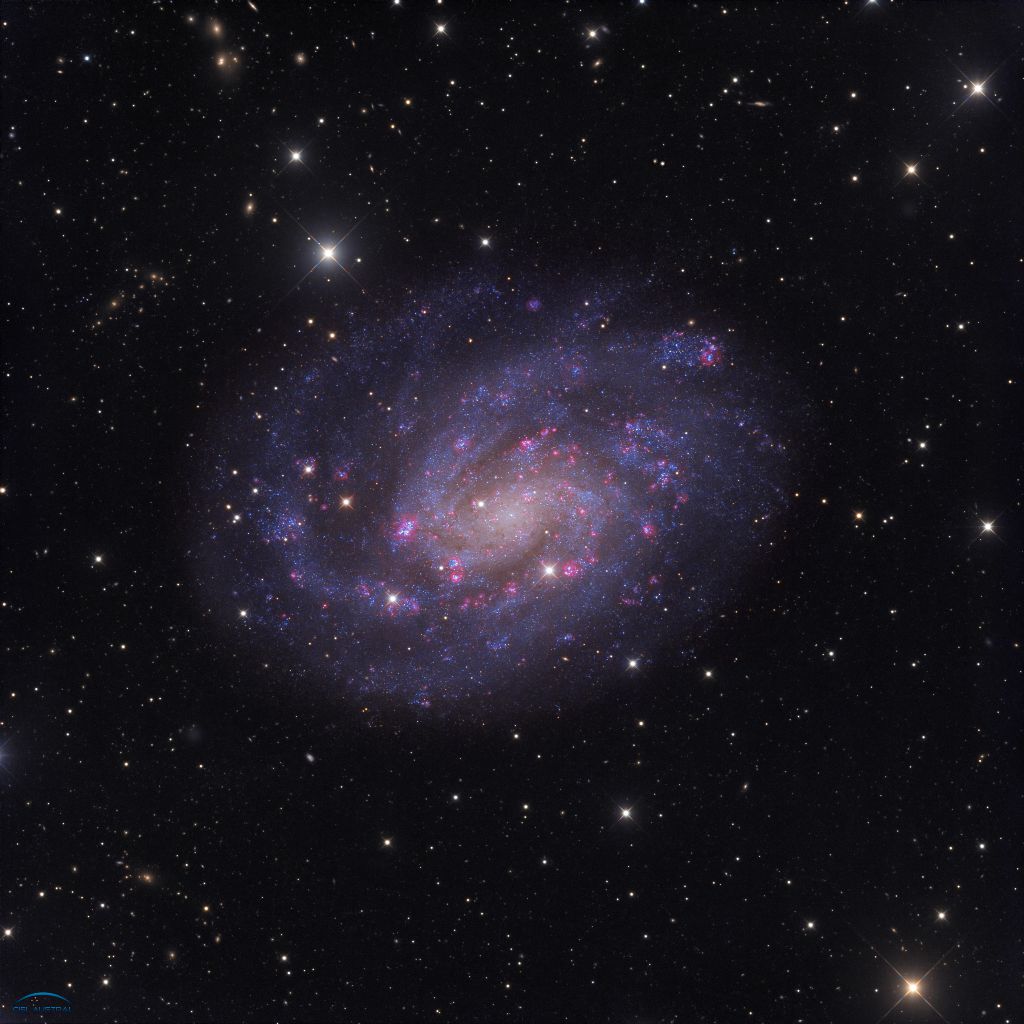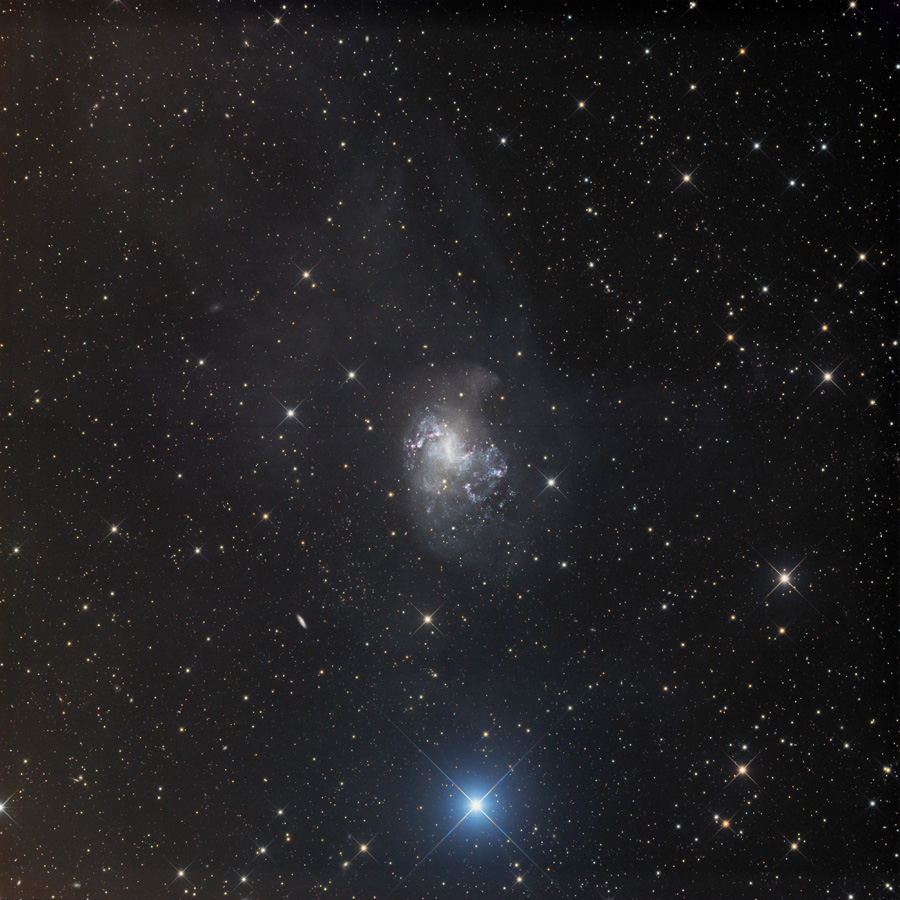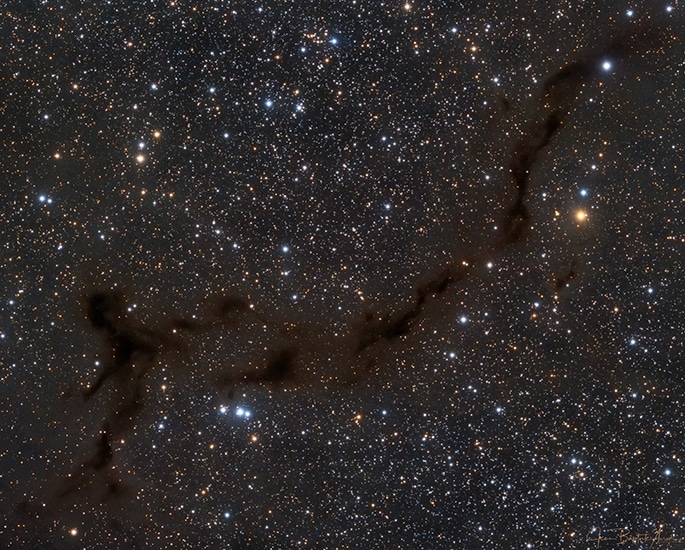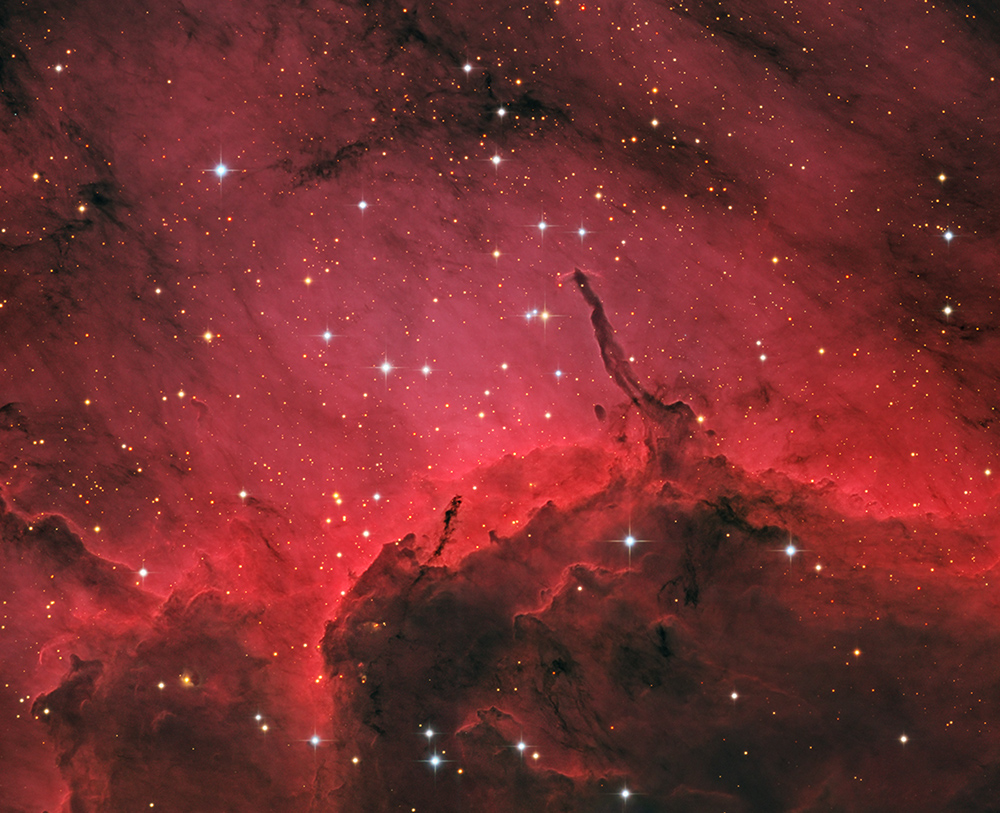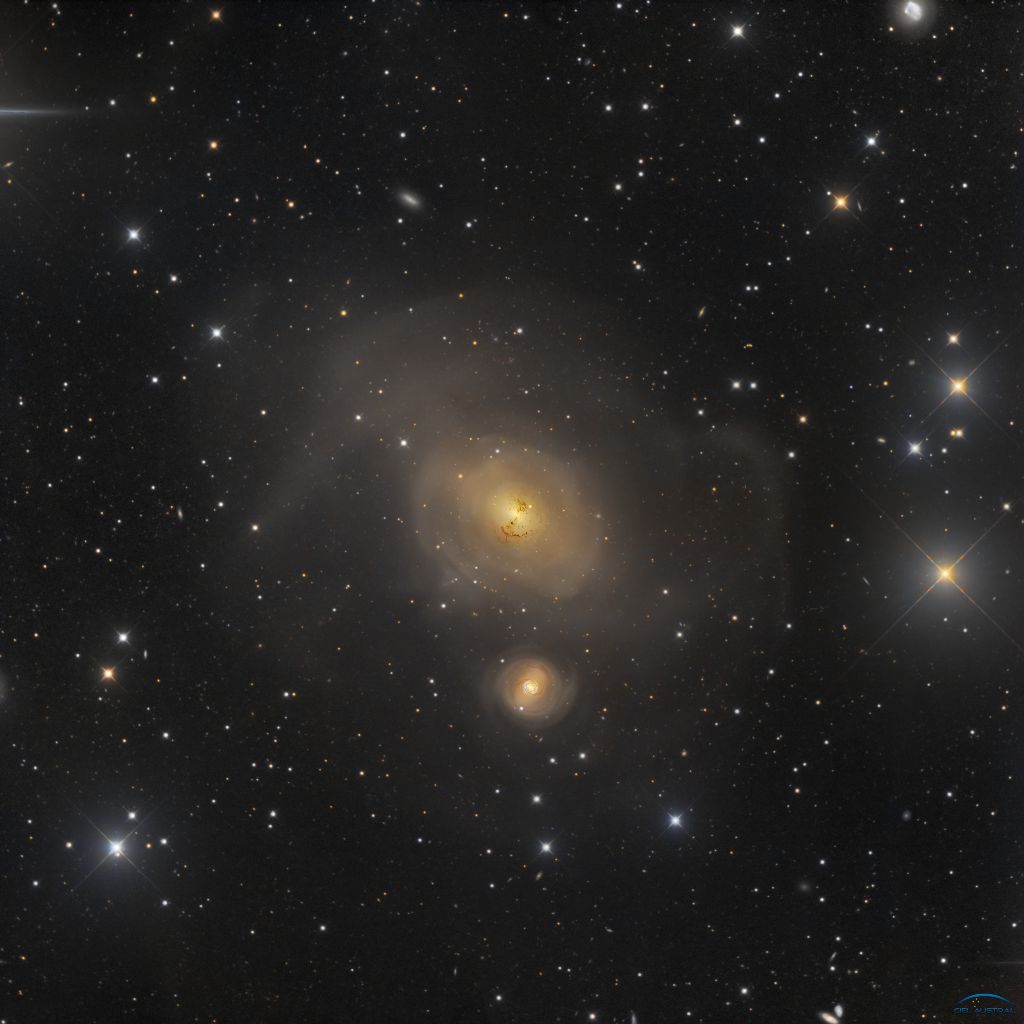Page 8 of 9
Re: Submissions: 2020 November
Posted: Wed Dec 02, 2020 9:55 am
by Ann
lucam_astro wrote: ↑Fri Nov 13, 2020 4:23 pm
CTB 1 (Abell 85, SNR G116.9+0.1) is a faint supernova remnant in the constellation Cassiopeia. It was originally cataloged by George Abell as a planetary nebula as Abell 85 but was identified by van der Bergh, Marscher and Terzian in 1972 as a supernova remnant based on its appearance in the optical as an almost perfect half-circle of radiative filaments. CTB 1 is approximately 10,000 light years away and physically spans roughly 100 light years in diameter. It is dated to be ~7,500-11,000 years old. (Hailey and Craig, Astrophys. J. 434:635, 1994).
The brightest arcs of the hydrogen shell can barely be seen in a single exposure with my optical train, while the OIII signal is significantly fainter. This image was the result of one of the first datasets collected in my brand new backyard roll-off roof observatory. The ability to squeeze every minute of clear sky was crucial to generate quality data for this faint deep-sky object.
The acquisition is primarily bi-color narrowband (Ha and OIII) and star color is replaced from RGB data. Calibration, stacking, and linear processing of the data in Pixinsight, star separation with Starnet (PI plugin). Non-linear processing in Photoshop CC with denoising using Topaz Denoise AI.
Equipment:
TS ONTC 10in f4
TV Paracorr Type 2
ZWO ASI 1600 MM Pro
Astrodon 3nm Ha, OIII and E-series RGB filters
AP1100GTO
Total exposure time: 52 hours
High resolution image and full acquisition details:
https://astrob.in/gmt1zg/0/
CTB1_FB.jpg
That's a fine picture of a supernova remnant! The whole thing looks like a balloon that someone has poked a hole in, so that it is slowly leaking out its gas content into the surrounding medium.
Ann
Re: Submissions: 2020 November
Posted: Wed Dec 02, 2020 10:01 am
by Ann
That's a fine and striking image of a skyscape full of stars and streamers of dust, and an (apparently) single galaxy mixed into it all!

Sorry I just had to copy your image, because Starship Asterisk* didn't allow me to post your url.
Ann
Re: Fornax A - shells, massive halo and tidal tails
Posted: Wed Dec 02, 2020 10:13 am
by Ann
strongmanmike wrote: ↑Sun Nov 15, 2020 12:50 am
Performing a complex dynamic tango and even at a distance of some 60 Million light years, NGC 1316 & 1317 have still managed to spread stars over an area of our sky the size of the Full Moon!..including a faint loop of stars, extending to the lower left in the image, which is almost the size of the whole rest of the galaxy merger!
You can see a full size image here:
https://pbase.com/strongmanmike2002/ima ... 9/original
The full extent of the debris spread out by this gravitational interaction is showcased clearly in this enhanced luminance version:
https://pbase.com/strongmanmike2002/ima ... 1/original
Copyright: Michael Sidonio
This is a very fine picture of one large galaxy whose tattered dust lanes and chaotic tidal features speak of a violent past collision, and a much smaller galaxy whose evaporating spiral structure and vanishing starforming ability speak of being unraveled by the gravity of its big neighboring bully.
Ann
Re: Submissions: 2020 November
Posted: Wed Dec 02, 2020 10:21 am
by Ann
marion165 wrote: ↑Sun Nov 15, 2020 5:15 pm
Comet C/2020 M3 (ATLAS) is seen about a degree away from Bellatrix on the evening of November 14, 2020. On this date, the comet is at its closest approach to Earth. The image was made of a stack of 73 fifteen second exposures taken with a Canon 80D and a Canon 200 mm f/2.8L II lens with a doubler. (ISO 2000, f/5.6, 400 mm). A few passing high clouds added a soft layer of diffusion to the brighter stars in the field of view. StarSpikes Pro was used as well as Nebulosity and Lightroom for processing.
Marion Haligowski - Thanks for 1M Views! on Flickr
Marion, I love it! The bright blue star and the faint green comet, what a lovely pair!

Sorry I had to exchange your url for a copy of your picture, because this site wouldn't allow me to copy your url.
Ann
Re: Submissions: 2020 November
Posted: Wed Dec 02, 2020 10:23 am
by Ann
KuriousGeorge wrote: ↑Sun Nov 15, 2020 8:31 pm
The Perseus Cluster of Galaxies. KG Observatory, Julian CA.
We had a very heavy rain on November 8th with 60 mph winds. This finally cleared into an unusually transparent and steady sky. FWHM on the 15-minute Luminance subs was between 1.4" and 2.1". Perfect conditions for shooting tiny distant galaxies. (-:
https://www.astrobin.com/4063x8/
This is a very fine portrait of the fascinating Perseus Cluster of galaxies!

Ann
Re: Submissions: 2020 November
Posted: Wed Dec 02, 2020 10:25 am
by Ann
This is a lovely portrait of bright blue Bellatrix with beautiful turquoise comet C/2020 M3!

Ann
Re: Submissions: 2020 November
Posted: Wed Dec 02, 2020 10:30 am
by Ann
SkyViking wrote: ↑Mon Nov 16, 2020 10:29 am
Amateur Detection of Light Echoes from Supernova 1987a
http://www.rolfolsenastrophotography.com
Copyright: Rolf Wahl Olsen
I have now made a couple of better images of the Light Echoes from Supernova 1987a.
This image shows what I believe is the first amateur detection of light echoes from SN1987a - 33 years after the event.
1: Colour animation of 8 years expansion of the light echoes:
https://www.rolfolsenastrophotography.c ... -3qZNGWP/A
2: An illustration of the supernova location and expanding light sphere:
https://www.rolfolsenastrophotography.c ... -kBQ4vcX/A
All images, cropped and full size, are available here:
https://www.rolfolsenastrophotography.c ... nova-1987a
The light echoes are produced when the initial flash from SN1987a is subsequently reflected off interstellar dust as light travels outward from the event. Direct light from the supernova was observed on Earth in 1987, and we then see light reflected from dust in the interstellar space arriving later because it has travelled further to reach us.
The animation was created by subtracting two Luminance images taken almost 8 years apart, on 24th Oct 2012 and 21st Sep 2020 respectively, in order to create a difference image which was then superimposed on a regular colour image of the area. The expanding light echoes appear as roughly circular concentric arcs, centered on SN1987a's location. This clearly shows how they have expanded during the 8 years.
The echoes also appear to be moving outwards at superluminal speed: With a shift of ~47 pixels in the image, and an image resolution of 0.764"/pixel, the movement corresponds to around 28 light years at the distance of the Large Magellanic Cloud where the supernova occurred (163,000 light years away). This is clearly much faster than the speed of light given there are only 8 years between the images. This apparent superluminal speed is only an illusion though, and does not represent the actual speed of the outward travelling light.
Image details:
Taken from my observatory in Auckland, New Zealand
October 2012:
Exposure: LRGB 83:67:27:27m, total 3hrs 24mins @ -30C
Telescope: Homebuilt 10" f/5 Serrurier Truss Newtonian
Filters: Astrodon LRGB E-Series Gen 2
September-November 2020:
Exposure: L 65m, total 1hr 5mins and H-Alpha 435m, total 7hrs 15mins @ -25C
Telescope: Homebuilt 12.5" f/4 Serrurier Truss Newtonian
Camera: QSI 683wsg with Lodestar guider
Filters: Astrodon 3nm H-Alpha and LRGB E-Series Gen 2
Rolf, this must be the most superb image posted at Starship Asterisk* during the month of November 2020! Not only is the field of stars and nebulosity of superior quality in itself, but the recording of the light echo after the supernova making its way across this lovely field makes the image unique and fantastic. Thank you!!


Ann
Re: Submissions: 2020 November
Posted: Wed Dec 02, 2020 11:45 am
by Wissam Ayoub
Ann wrote: ↑Wed Dec 02, 2020 6:04 am
Wissam Ayoub wrote: ↑Mon Nov 02, 2020 8:40 am
Hi,
Thank you so much for this opportunity,
I also submitted my image yesterday in the October 2020 submissions due to the time difference with the US as the November submissions page was not yet available

Sorry for any duplicated data.
My submission:
The HEART of the Lagoon Nebula M8
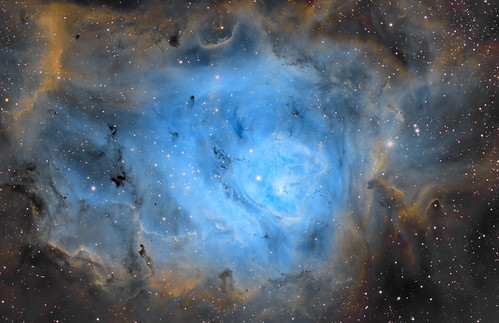

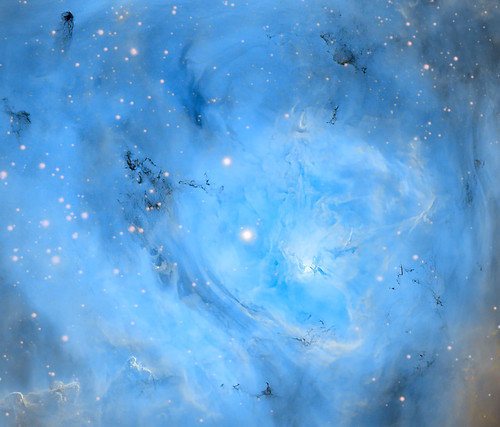
Imaging telescope: Explore Scientific 127mm ED TRIPLET APO.
Imaging camera: ZWO ASI1600MM Pro-Cool.
Focal reducer: Explore Scientific 0.7 Reducer/Flattener.
Mounts: iOptron CEM60.
Software: Photoshop CC 2020 Photoshop · PixInsight 1.8.8 Ripley · DeepSky Stacker (DSS) Deepskystacker 3.3.6
Filters:
Astronomik SII 1.25" 12 nm
Astronomik Ha 1,25" 12 nm
Astronomik OIII 1.25" 12nm
Locations: UAE desert, Abu Dhabi, United Arab Emirates
Copyright: Wissam Ayoub
Thank you,
Wissam, you're killing me! I can't resist that shade of blue!!

Ann
Thank you so much Ann, happy that you like it

Wissam,
Re: Submissions: 2020 November
Posted: Wed Dec 02, 2020 11:46 am
by Wissam Ayoub
Ann wrote: ↑Wed Dec 02, 2020 6:26 am
Wissam Ayoub wrote: ↑Thu Nov 05, 2020 8:55 pm
Hi,
My submission:
Inside the Tarantula NGC 2070 - HST data

12539 × 13060 pixels.
HST data.
Processed in HOO.
Copyright: Wissam Ayoub
Thank you,
Wissam, I think that's a brilliant image of the Tarantula nebula with the NGC 2070 and Hodge 301 clusters!

Ann
Thank you so much Ann, appreciated

Re: Submissions: 2020 November
Posted: Wed Dec 02, 2020 12:24 pm
by Ann
That's a fine picture of the Heart and Soul nebulas! I like how the red outlines and blue interiors bring out the shape of these iconic nebulas.
Ann
Re: Submissions: 2020 November
Posted: Wed Dec 02, 2020 12:26 pm
by Ann
That's a fine portrait of the beautiful, delicate spiral galaxy, NGC 300!
Ann
Re: Submissions: 2020 November
Posted: Wed Dec 02, 2020 12:29 pm
by Ann
ZoliroAstro wrote: ↑Wed Nov 18, 2020 9:41 pm
Exploring the Universe in One Night
I shot 15 different targets in one night using an H-alpha filter. Each photo is one 600s exposure. I did some linear noise reduction on each photo with MLT in Pixinsight, then I stretched them. I made the collage using Adobe Spark and then finished the final adjustments in Photoshop.
Each photo 1x600s at 200 gain, -20c from Bortle 4 skies *Edit: I forgot to mention that some of photos were software binned 2x2.
Equipment:
Astro-Tech AT115EDT
EQ6-R Pro
ASI1600mm Pro
ASI224mc
Baader 1.25" Ha 7nm filter
ASIair Pro and ZWO EFW filter wheel
Ha Collage APOD.png
Hi and welcome to Starship Asterisk*! That's a lot of nice images of nebulas and one galaxy!

Ann
Re: Submissions: 2020 November
Posted: Wed Dec 02, 2020 12:37 pm
by StefanMuckenhuber
M101
Expsoure time: 15h
Better quality:
https://www.astrobin.com/full/od9yv4/0/
Re: Submissions: 2020 November
Posted: Wed Dec 02, 2020 12:43 pm
by Ann
Thank you for this great photo of one of my favorite galaxies, NGC 1313! I was particularly glad that you included the A3V-type foreground star, HD 20888, for color comparison. HD 20888 is a modest type of blue star, a bit bluer and hotter than well-known Altair in the Summer Triangle, but not by much. Even so, this star is so much bluer than the galaxy, NGC 1313 - and yet NGC 1313 is really blue as galaxies go!
Yes, but this color difference makes sense. The B-V index of NGC 1313 is +0.49, while the B-V index of star HD 20888 is +0.13, which is to say that the star is much bluer than the galaxy. But your very fine image gives us a hint as to why that is so. We can see two "wings" or tidal arms in the galaxy, stretching upwards and downwards, which are clearly dominated by old red stars, redder than the Sun. It is this abundance of old red stars that reddens the overall color of the galaxy.
In the central part of NGC 1313 there are large numbers of brilliant blue stars, many of spectral type O, and giant pink emission nebulas giving birth to more blue stars. But the integrated colors of the entire galaxy are muted and subtle in your image, and I think that is absolutely right. That's what galaxies look like "in reality".
Thank you for this great image, I love it!
Ann
Re: Submissions: 2020 November
Posted: Wed Dec 02, 2020 12:46 pm
by Ann
Rositsa wrote: ↑Thu Nov 19, 2020 3:55 pm
The lunar dance in 30 days
https://tripswithrosie.com/
Copyright: Rositsa Dimitrova
THIS is how the Moon moves throughout a full lunar cycle and it "only" took 7 months to shoot it.
I'm currently shooting a solar analemma, so a few months back I started wondering how the path of Moon would look like for a single lunar cycle. I'd seen many lunar panoramas that were completely unrealistic and I really wanted to create a realistic one. I started shooting the different phases of the Moon, but due to cloudy days it took me solid 7 months to do it.
Afterwards, I used Stellarium to check the coordinates of the Moon in the sky for each day - from February 8th to March 8th 2020 (for location: Bulgaria) adjusted by 51 minutes (which is the average time between moonrises every day). I also took into account the inclination of the Moon on that exact date and time. I managed to translate these Stellarium calculations into Photoshop, as I wanted the positions to be as precise as possible.
Shot on Sony A7iii, Sigma 100-400mm (lunar phases) + Sony 28mm (foreground & sky)
Socials:
https://www.facebook.com/tripswithrosie/
https://www.instagram.com/rosie.kerrigan/
Hi and welcome to Starship Asterisk*, Rositsa! That heart-shaped Moon dance is lovely to see!

Ann
Re: NGC1333 Embryon Nebula
Posted: Wed Dec 02, 2020 12:47 pm
by Ann
To me, the colors, details and overall composition of this image is achingly lovely.
Ann
Re: Submissions: 2020 November
Posted: Wed Dec 02, 2020 12:50 pm
by Ann
IC 342 is a lovely galaxy, although mostly hidden behind Milky Way dust. Your image gives full justice to the galaxy's delicate shape and soft, muted, dust-reddened colors. It almost looks like a lovely little golden bauble that you could hang in your Christmas tree.
Ann
Re: Submissions: 2020 November
Posted: Wed Dec 02, 2020 12:54 pm
by Ann
PDXPat wrote: ↑Fri Nov 20, 2020 8:47 pm
IC1805 and IC1848 - The Heart and Soul Nebulae
https://flic.kr/p/2k8DTQc
Copyright: Patrick Pesetti
Taken in Northern California (Bortle Class 4 - rural/suburban transition) on 14-Nov-2020.
Equipment used:
- Canon R6 with Tamron 150-600mm lens. Lens set to 200m
- 60 Light frames. 120 second exposure, ISO 800, f/5. 2 hours total.
- 32 Dark frames. 120 second exposure, ISO 800, f/5.
- Initial preparation in Adobe Camera Raw (Adjusted exposure, brought down highlights, brought down temperature, lens profile correction).
- Stacked with Deep Sky Stacker
- Post-processing in Photoshop (levels, curves, selective color and de-noising).
Hi and welcome to Starship Asterisk*! The soft red outlines and even softer blue insides of these iconic nebulas make them look like enchanted beings out of a fairy tale, flitting and floating like magical creatures in the Milky Way. It's a very attractive image!

Ann
Re: Submissions: 2020 November
Posted: Wed Dec 02, 2020 12:58 pm
by Ann
I can't resist this "Running Man" who leaves a long trail of dust behind him!

Ann
Re: Submissions: 2020 November
Posted: Wed Dec 02, 2020 1:03 pm
by Ann
Wow, George, It's so impressive that you managed to show us "The Dragon", the set of lensed galaxies, from a distance of 5 billion light years!
Oh, no, wait! It's more impressive than that! It's the foreground Abell 370 Galaxy Cluster that is 5 billion light years away, so the lensed galaxy is even farther back into the early epochs of the Universe!
That's stunningly well done, George!

Ann
Re: Submissions: 2020 November
Posted: Wed Dec 02, 2020 1:05 pm
by Ann
AstroGabe wrote: ↑Sat Nov 21, 2020 7:38 pm
The California Nebula, NGC1499.
Details:
Scope: Astro-Physics 92mm Stowaway @f/5.3
Reducer: Astro-Physics 0.8x telecompressor
Camera: ASI6200MM Pro
Guide Camera: ASI174MM Mini
Mount: Mach1 GTO
SII: 24x15min
Ha: 20x15min
OIII: 41x5min total
Software: Voyager, PHD2, APCC, Pixinsight
21.2 hrs total exposure
Imager/Processing: Gabe Shaughnessy
Astrobin for more details:
https://www.astrobin.com/7fiviz/B
https://cdn.astrobin.com/thumbs/A-YTQsu ... sHzdbN.png
Your California Nebula is very beautiful and detailed, so I recommend everyone to click on the link to see it!
Ann
Re: Submissions: 2020 November
Posted: Wed Dec 02, 2020 1:08 pm
by Ann
That's a lovely image! The Herbig Haro object, the tall thin dust pillar, is wearing a little a little "hat" on "his head". That is undoubtedly a pair of jets emitted by a baby star. Very beautiful image!
Ann
Re: Auriga
Posted: Wed Dec 02, 2020 1:11 pm
by Ann
That's a fine and interesting set of portraits of IC 405 and IC 410. Your images almost make it seem as if these two nebulas are connected, but they aren't, are they? I'm pretty sure that IC 410 is a background object.
Anyway, nice images!
Ann
Re: Submissions: 2020 November
Posted: Wed Dec 02, 2020 1:13 pm
by Ann
That's a very fine image of NGC 1316 and NGC 1§317! The dust debris in NGC 1316 looks particularly impressive.
Ann
Re: Submissions: 2020 November
Posted: Wed Dec 02, 2020 1:15 pm
by Ann
_TheHeavensDeclare wrote: ↑Mon Nov 23, 2020 5:30 am
Autumn Milky Way
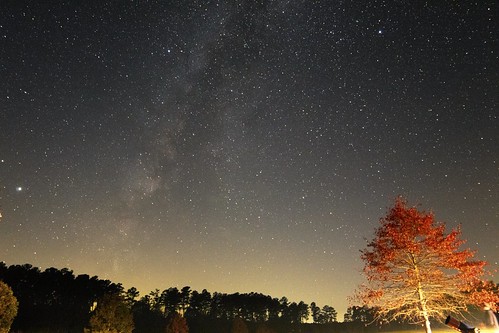 Autumn Milky Way
Autumn Milky Way by
The Heavens Declare, on Flickr
The brilliant colors of leaves changing is just another sign that Milky Way core season has passed yet again, leaving us waiting for another Winter season of Orion.
Technical details:
-Canon Rebel t6
-25sec exposure at 3200
-Dark Sky site in Virginia, United States during November 2020
-Photoshop for levels/color adjustment
This is just such a beautiful image! Talk about the autumn Milky Way!

Ann










